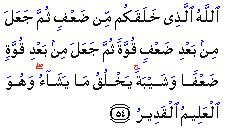State of Weakness, Tolerance in Ijtihad, Reckless Rejection
Issue 530 » May 22, 2009 - Jumada al-Awwal 27, 1430
Living The Quran
Al-Rum (The Byzantines)
Chapter 30: Verse 54
 State of Weakness
State of Weakness
"It is God who creates you in a state of weakness, and then after weakness He brings about strength in you, and then after strength He brings about your weakness and old age. He creates what He wills; and He alone has all knowledge and power."
In this verse we see the beginnings in our own life, and we see the end brought to them in a vivid image as though it were happening before our own eyes. We only need to have a receptive mind to gather the inspiration behind the verse.
The weakness in man's formation meant here has several aspects to it. It includes the physical weakness of the single, tiny cell that makes the foetus which goes through several stages, remaining weak throughout all of them. This weakness continues during childhood, until the person reaches adolescence and the prime of youth. Another weakness is that of the substance from which man is made, which is clay. Had it not been for the breath of God's spirit, man would have remained in the physical image of clay or in an animal image. Both of these are very weak compared to man. There is also the psychological weakness that makes man yield to desire, passion and lust. It is again the breathing of God's spirit into him that gives him the ability and resolve to resist such emotions. Without this spirit man would have been weaker than animals which behave according to their natures.
The strength mentioned here covers all those aspects discussed under weakness: strength in physical build, human potential, mental ability and psychological constitution.
Old age is a decline into childhood in all aspects. It may be accompanied with psychological decline due to weakness of will. An old person may have an urge similar to that of a child without having the willpower to resist it. The Arabic word shaybah, translated here as 'old age' also connotes 'grey hair'. It is specially selected here to give a tangible impression of old age.
No one escapes these stages. They never fail to affect anyone who survives; nor are they ever slow so as to come later than usual. These stages confirm that mankind is subject to a greater will that creates and determines as it pleases. That is the will of God who determines the age, life and stages of every creature in accordance with perfect knowledge and elaborate planning.
Compiled From:
"In The Shade of the Quran" - Sayyid Qutb, Vol. 13, pp. 397, 398
Understanding The Prophet's Life
Tolerance in Ijtihad
"When a judge exercises ijtihad and gives a right judgment, he will have two rewards, but if he errs in his judgment he will still have earned one reward." [Abu Dawud]
This hadith evidently encourages the spirit of tolerance in ijtihad by promising a reward even for one who might have inadvertently fallen into error. Since the hadith has taken a positive view of such effort, scholars and mujtahids are also required to exercise restraint in denouncing a view which they might consider erroneous.
This hadith also lends support to the conclusion that a judicial decision that is made in the true spirit of ijtihad is enforceable and the judge may not be taken to task for it if it later turns out that he had made an error of judgment. Similarly, when a person trusts the integrity and knowledge of a scholar of Shariah and acts upon his verdict (fatwa) on a legal question but later discovers that the fatwa was erroneous, he would have committed no wrong, simply because the hadith exonerates an error of that kind in the first place. The reward that is promised is, however, earned only by those whose sincerity and devotion to a good cause are not in question.
Compiled From:
"Shariah Law - An Introduction" - Mohammad Hashim Kamali, p. 108
Blindspot!
Reckless Rejection of Sahih Hadith
Haste in rejection of any Hadith, though it is Sahih (authentic) and affirmed, makes its having been understood doubtful. Those deep-rooted in knowledge do not venture recklessness in rejecting Sahih Hadiths. Rather, they approve the opinion held by the early generations of the Community (Salaf). For when it is established that they accepted a Hadith, and no esteemed leader censured it, then necessarily they did not recognize any criticism of it on grounds of irregularity nor any cause of objection to it.
A fair-minded scholar must let the Hadith stand, and study the intelligible meaning or the appropriate interpretation of it. This is the point of division in this field between Mutazilis (absolute rationalists) and Ahl al-Sunnah (the Sunnis, those who followed the Prophetic tradition). The former were prompt to dismiss every difficulty of Hadith that resisted what they had accepted as principles of knowledge and religion. But Ahl al-Sunnah applied their minds to interpretation of the difficult Hadith, and to bringing together what, outwardly, was at variance, and reconciling what was contradictory.
Once the evidence of a Hadith's being from the Prophet has been affirmed, a far-reaching, thorough examination into how it may be understood is obligatory; and there must be every caution against dismissing it merely to please far-fetched arguments, which may themselves have a mistake hidden in them.
Compiled From:
"Approaching the Sunnah: Comprehension & Controversy" - Yusuf Al-Qaradawi, p. 37-38.